
Discover your International Online Potential
The author's views are entirely their own (excluding the unlikely event of hypnosis) and may not always reflect the views of Moz.
One of the major advantages of having a web-based business presence is the opportunity to reach a global audience, eliminating many of the restrictions and costs that a “physical” international presence might have. Nonetheless, from my day to day experience I’ve found that there is still a lack of vision of opportunity to target international markets.
Ask yourself: when was the last time you checked how many visitors were coming to your site from other countries? Even if you have a small or mid-sized business, do you frequently check what's the percentage of your current conversions coming from other countries and languages than yours?
Besides being an International SEO, I consider myself a cultural broker: I'm a Nicaraguan living in Madrid. I speak English and French in addition to my native language, which is Spanish. I love to travel and I've had the opportunity to do it because of work (and also for pleasure) to places like Argentina, Costa Rica, El Salvador, Turkey, Tunisia, Montenegro, and Russia (on top of other, more common destinations such as the UK, US, France, Italy, Ireland, The Netherlands, Switzerland, etc.). I've had Nicaraguan, Argentinian, Dutch, Spanish, and German bosses in the past, and now I have an American one.
I've also worked in the past as an SEO for:
- A Dutch owned online marketing agency in Spain with clients from all over Europe
- A Spanish owned Vertical Web portal targeting eight Latin American and European countries
- An online marketing provider for Spanish small businesses owned by a French group
- A Russian company targeting the European market
Currently, I work for an American online marketing agency targeting international clients. As you can see, the “international” component has been a common characteristic in my personal and professional life, and I cannot imagine how there's still a lack of vision and openness towards international activities, which at the end means lost opportunities for businesses and a less rich and competitive market that will end up also hurting the audience.
Unfortunately, this frequently happens because of misconceptions about expanding internationally. I want to share and clarify here three of the most common misconceptions I find in my every day work.

I'm not telling you to leave your current market (and lose your current profits), but to take others into consideration. At the beginning, it will be only to assess the opportunities there, so really, you don't have anything to lose. I also know that we all tend to feel like we're already in the "center of everything," and a couple of World Maps from different countries are the best proof of it:
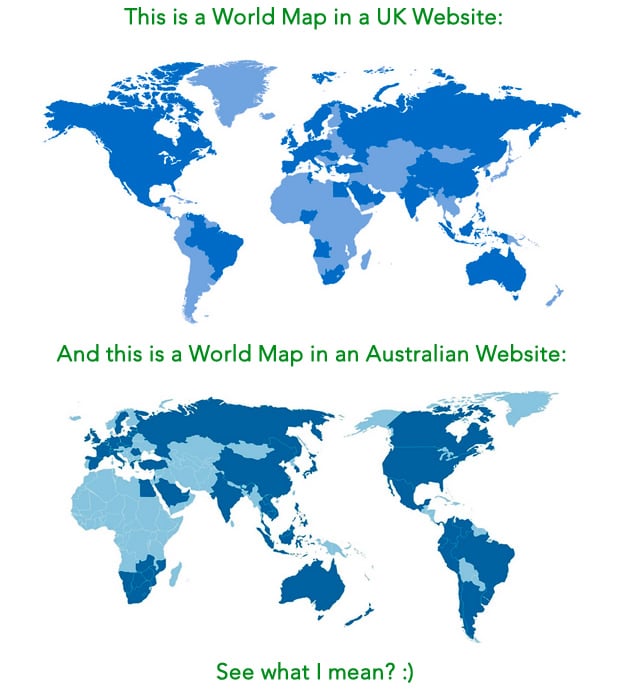
According to a recent eMarketer study, B2C E-commerce sales will grow 18.3% to $1.298 trillion worldwide and Asia-Pacific will surpass North America to become the world's No. 1 market:
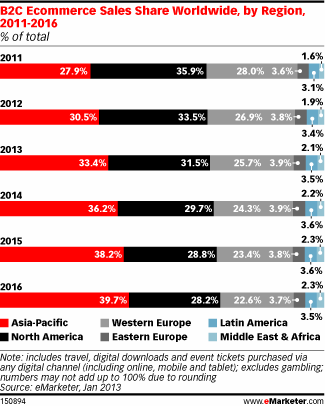
Additionally, in the same study we can see how Asia-Pacific and Western Europe as regions have both more digital buyers (Internet users who buy goods online) than North America:
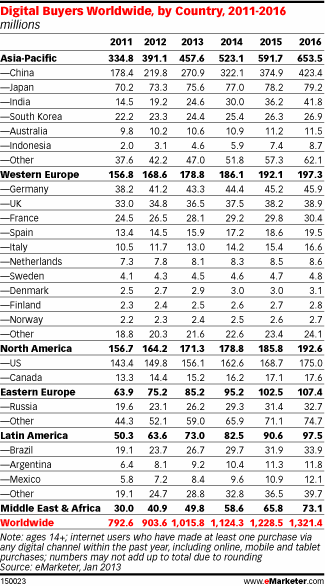
As you can see, nowadays no one is really in the "center." There's enough globally "distributed" potential out there, and the highest growing ones are in countries like China. Wake up! This means more exciting possibilities for your business internationally.

You don't need to be a large international corporation, an E-commerce business, or a completely online based business to benefit from a website version in other languages, or targeting to other countries.
Although from a business perspective it can be more straight-forward for these type of sites to identify an international potential, there are also different types of local businesses that have an international audience, or that can additionally benefit from having an international online presence since their target market can be also abroad or from abroad. For example:
- Language schools: such as Spanish language schools in Spain or Latin America targeting US, German, or UK students
- Summer camps: like international summer camps in Switzerland targeting children from abroad
- Centric hostels and apartments rentals: located in touristic or centric areas that can be attractive for tourists
- Traditional restaurants and bars: that usually have tourists as clients
- Volunteering organizations: looking to attract volunteers from abroad
- Gift and flower shops: which might also suitable to send from audience abroad
- Traditional art and crafts shops: that look to sell typical local goods to foreigners
- Traditional food and drinks shops: like cured ham factories or wineries in Spain looking to sell their products abroad
You need additional incentive? Check-out a mobile search engine result page for a local query in Google.es for "restaurantes en brooklyn" (restaurants in Brooklyn), that in English would be usually taken by Google maps results:
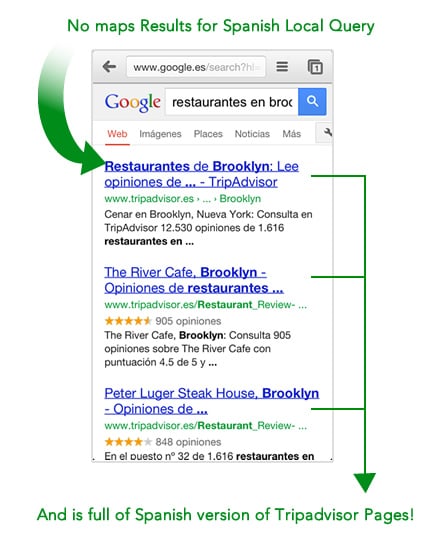
There's a huge opportunity, indeed. You can definitely achieve additional benefit targeting an International audience even if you are not a big company or based internationally!

It's true that expanding your site presence internationally might have higher costs than your local language version. From deploying the web platform in a new ccTLD (or subdirectory if it's not a country but a language targeted version) to localizing (not only translating) the content, having native language support to expand your content and social media marketing strategies (that also need to take into consideration the local audience behavior, using the criteria I've previously shared in this post), as well as to support your outreach and community management efforts in this other language.
Nonetheless, this doesn't mean that expanding your site internationally should be non-beneficial for you. When you implement complete research to identify the potential organic traffic and conversion from each language and country and on the other that you validate from the start, this potential revenue will surpass the costs related to your international web presence:
.png)
With this information, you will be able to calculate the expected international presence (as well as international SEO process) return on investment:

I've seen too many situations where this type of initial assessment hasn't been done, and because of this, there are businesses that have ended up with many languages or country site versions that have been developed without any clear strategy. They don't answer to a business related goal and are simply the "literal translation" of the main site version. Of course they're not profitable! But it's because the international web project hasn't been correctly developed.
Another common signal when an international site presence hasn't been effectively planned or executed is when the site owner tells you that they have their UK site version with the exact same content than the US one but they cannot afford to update it to make it unique, specifically targeting the UK audience.
If they cannot afford it, this means that they're at the moment not getting any or enough benefit from it; whether because they likely don't have any strategy behind and this presence is potentially not optimized, or because there's not enough potential in this market and they haven't been able to identify this since they didn't do any research previously. It's also our work to advise our clients effectively from the start, validate the potential benefit from any international development or SEO project, and warn them if, for some reason, there's no potential.
Additionally, we can run pilot projects to test the market, just with the most important product or services categories with targeted landing pages, so as you can see there's no excuse for a non-successful international web presence that has been effectively planned, well developed, and optimized.

With a couple of very simple analysis steps that shouldn't take much of your time you can have an overview of the potential your business might have internationally:
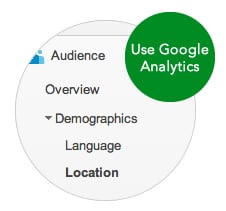 |
Check your International traffic status |
Go to the Audience > Demographics > Location & Language reports in Google Analytics to check the percentage of your website visitors coming from other countries and using browsers in other languages.
Verify the volume and trends from the last couple of years for all of your traffic as well for only organic and compare them:
- Is there a high or growing percentage of visitors coming from other countries?
- What's the volume and trend of conversions and the conversion rate of visitors coming from other countries?
- What's the traffic source of visitors coming from other countries? Direct, organic, referrals?
- Which are the keywords and pages attracting this international traffic?
You have a bit more of time? If so, go to Google Webmaster Tools to validate the visibility you're getting already in Google search result pages from other countries, along with the queries and pages impressions and clicks.
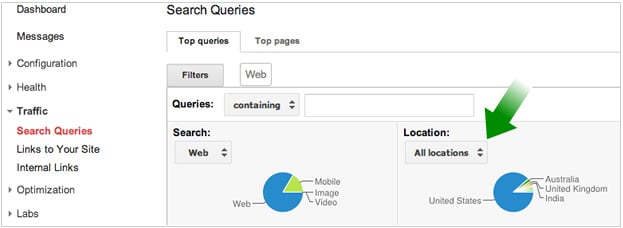
This is just your starting point that will help you to prioritize the international markets where you have already have activity and might be initially easier to start with.
Nonetheless, if numbers are not high it doesn't mean you don't have potential, but that maybe your efforts have been highly targeted to your current audience and haven't had a high international impact until now, so you will likely need to work harder at the beginning.
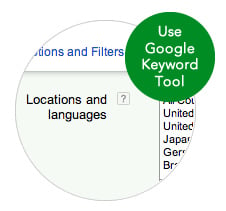 |
Identify your International Organic potential |
Prioritize the countries that you have already identified with higher traffic activity in your Website before and do a quick keyword research for each one of them by selecting the desired location and language from the Google's Keyword Tool Advanced Options and Filters.
You can use the keywords that you have identified in the previous analysis that are already giving visibility and traffic from these countries and languages. If you didn't identify any keyword information in the previous analysis and the country you need to research is non-English speaking (or in other language than yours), then the best option at this level is to take the keywords in your current language, use Google Translate to quickly translate them to the desired one and use them for this initial and quick validation and overview (It's important to note that this is ok just for this initial, quick analysis, since these keywords will likely have errors and missing opportunities. You can do a complete international SEO research and process without speaking the language but with the right process and local language support, as I've described in this post).
Use the exact match type (to get more "realistic" data that you can expect for each specific keywords) and check:
- What's the local monthly search volume for the relevant keywords in each of the countries and languages?
- Are there more suggested keyword ideas with a high level of search volume?
Refine and expand the research according to the suggestions you get for them.
You have a bit more of time? If so, go to SEMRush or Search Metrics Essentials (that support many countries) to identify more keywords opportunities:
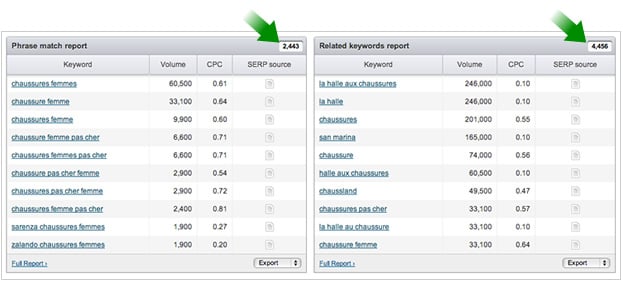
Is there a high search volume potential for the verified countries and languages? If so, congratulations! This are great news.
It's time then for you to develop a full International SEO research to understand, validate and plan your strategy, and verify your potential costs, revenue, and ROI, taking into consideration all of the necessary aspects, from a business abd language to technical capacity, restrictions, and requirements.
To do this, take a look and follow the step-by-step guide I published some weeks ago about it:
How to start your international web presence

Images under Creative Commons taken from Flickr.




Comments
Please keep your comments TAGFEE by following the community etiquette
Comments are closed. Got a burning question? Head to our Q&A section to start a new conversation.